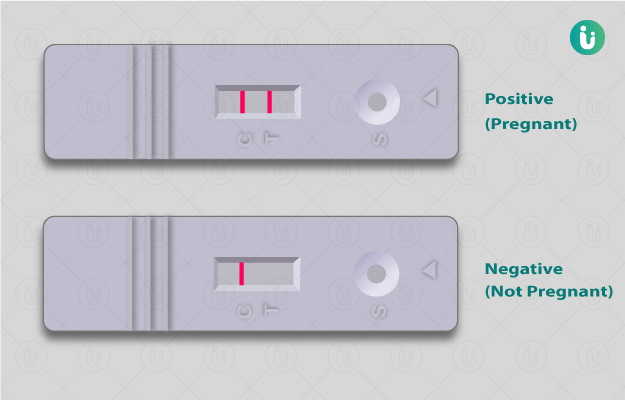Carrying out a pregnancy test is one of the most anxious times for a woman because it depends on whether she wants or does not want to get pregnant. Despite how easy and quick these kits are, the news that they bring is always a life-changing moment for every woman. Most of the pregnancy test kits detect the presence of a pregnancy hormone called hCG (human Chorionic Gonadotropin). There are various types of pregnancy tests, which, depending on the procedure involved, are used by people and health professionals.
Read more: Beta HCG test
To perform the urine pregnancy test, a strip, cassette, or a midstream device may be used. After this, the interpretation of the results is done according to the manufacturer's guidelines. Since the pregnancy test kits do not have a 100% accuracy, a confirmatory pregnancy test is performed in a healthcare facility by either using a blood sample or by doing an ultrasound.
What does a pregnancy test involve?
The detection of the pregnancy hormone, hCG (human Chorionic Gonadotropin), in the urine or the blood is the underlying principle of pregnancy tests. Hence, the term "pregnancy test" is a misnomer because the test includes the detection of a hormone and not the fetus. This hormone is released from the placenta shortly after the early embryo attaches itself to the inner lining of the uterus.
Hence, it is an important marker of pregnancy. Besides the urine test, pregnancy test performed in a healthcare facility detects the presence of hCG in blood while an ultrasound uses sound waves to check the presence of the foetus in the womb.
- Types of pregnancy tests
- When to take a pregnancy test
- Pregnancy test at home
- How accurate are pregnancy tests
- Pregnancy tests at clinics
- Clinical pregnancy test cost
Types of pregnancy tests
Pregnancy tests are divided based on the use of hCG and ultrasonography (USG) as follows:
Based on hCG
- Blood tests
These tests are done to detect serum hCG and are usually performed three weeks after the last menstrual period (LMP). A pregnancy test with blood serum is performed only at healthcare facilities. - Urine test
These tests are meant to detect the presence of hCG hormones in the urine sample of the woman and are performed five weeks after the last menstrual period. A pregnancy test using the woman’s urine may be done at home or at a healthcare facility.
Based on USG
These tests are performed by a gynaecologist using a probe that sends and receives the sound waves.
- Transvaginal
In transvaginal USG, the probe is inserted 2-3 inches into the woman’s vagina and the internal reproductive organs are examined. This test is usually done after five weeks of the last menstrual period and helps in confirming an early pregnancy. - Transabdominal
In transabdominal USG, a jelly is applied over the skin of the lower abdomen and the pelvic area. This helps in a better transmission of the sound waves. After that, the probe is glided over the jelly and an image is created on the monitor. A transvaginal USG is usually performed six weeks after the last menstrual period.
When to take a pregnancy test
In order to know when to take a pregnancy test, it is important to learn a bit about the menstrual cycle in women. In a menstrual cycle, the ovum (egg) is released within a period of two to three days before or after the 14th last day (14 days from the end of the cycle). These are known as fertile days. If you have sex during this period, the chances of conception or getting pregnant are higher as compared to the other days of the cycle.
If the egg gets fertilised, the placenta starts producing hCG after one week of the attachment of the embryo to the inner lining of the uterus. This hormone starts appearing in the urine and blood after the 9th day and reaches its peak between the seventh week and ninth week of pregnancy.
Hence, if you are suspecting that you’re pregnant, you may take a pregnancy test at home using a pregnancy kit after the third week of the last menstrual period. You may also go to a gynaecologist to get the ultrasound done to confirm your results.
Read more: Period pain treatment
Pregnancy test at home
There are several over-the-counter (OTC) pregnancy test kits available at the drugstores at affordable prices. However, the price also depends on the brand and the number of tests available in the kit. You may buy a kit from the options available and use them at home to do a pregnancy test yourself.
Doctors advise that it is better to do the test at least three times to ensure the results are matching. The test should always be done early in the morning because the first urination has a good amount of hCG in it. Hence, the chances of getting a true result are better.
Read more: Pregnancy diet
How accurate are pregnancy tests
Many gynaecologists suggest that the results of a self-diagnostic pregnancy test may vary depending on various factors such as
- How the test is performed.
- If the strip/ sample well/ absorbent pad is contaminated.
- The digital screen is faulty.
- The amount of urine sample used.
- The duration for which the woman waits before interpreting the results.
- Personal bias towards the kits that they might be right or wrong.
Hence, most doctors suggest taking the test at least three times before coming to a conclusion. They also suggest that a final diagnosis by a doctor should be done to confirm whether the woman is actually pregnant or not. The result that you get may be true or false and they tell about the specificity and sensitivity of the tests, such as
- True negative result
A true negative result means that the result is negative and the woman is not pregnant. - False-positive result
A false-positive result is when the test has failed in detecting that the woman is not pregnant and still shows that she is. Hence, it is a false-positive result. It can happen in certain conditions and diseases such as a recent miscarriage or an abortion during early pregnancy (the hormone may appear in the blood serum for a period of at least six weeks), interpretation error (a completely colourless visible line may be interpreted as a positive result), medications for stress, mental health problems, seizures, high blood pressure, and Parkinson’s disease. Medical conditions such as UTI (urinary tract infections), kidney diseases, cancer, and ovary problems may also show a false positive test. - True positive result
A true positive result signifies that the test was positive and the woman is also pregnant. - False-negative result
A false-negative result means that the woman is actually pregnant but the test failed to show any such results. Some conditions and factors which result in a false negative result include testing yourself before the foetus has attached itself to the uterine lining, expired test kit or low-quality test strips, taking the test late during the day, among others.
Find best medical apps
Pregnancy tests at clinics
As mentioned above, the pregnancy tests done at home are not always 100% accurate, and one should, therefore, visit a gynaecologist to confirm the test results. It will not only help in detecting an early pregnancy but also in diagnosing an ectopic pregnancy (attachment of the embryo at abnormal places such as the fallopian tubes and the ovaries).
The gynaecologists may either advise a blood test or an ultrasound. Depending on that, either a blood sample may be taken, or a transvaginal or transabdominal ultrasound may be performed. The results of a blood test may require from three days to a week to be confirmed, but ultrasound gives immediate results.
Read more: Ultrasound during pregnancy
Clinical pregnancy test cost
Depending on the type of hCG pregnancy test (urine or blood) done at the healthcare facility, the cost may range from 200 to 500 INR. An ultrasound costs more than the hormonal tests and may range from 600 to 1200 INR.
Find Obstetrician and Gynaecologist in cities
- Obstetrician and Gynaecologist in Bangalore
- Obstetrician and Gynaecologist in Mumbai
- Obstetrician and Gynaecologist in Ghaziabad
- Obstetrician and Gynaecologist in Chennai
- Obstetrician and Gynaecologist in Pune
- Obstetrician and Gynaecologist in Delhi
- Obstetrician and Gynaecologist in Hyderabad
- Obstetrician and Gynaecologist in New Delhi
- Obstetrician and Gynaecologist in Gwalior
- Obstetrician and Gynaecologist in Gurgaon
Doctors for Pregnancy tests: home test, clinical test, cost and results

Dr. Ayushi Gandhi
Obstetrics & Gynaecology
4 Years of Experience

Dr. Anjali
Obstetrics & Gynaecology
23 Years of Experience

Dr.Anuja Ojha
Obstetrics & Gynaecology
20 Years of Experience

Dr. Geeta Kulkarni
Obstetrics & Gynaecology
7 Years of Experience
References
- Office on Women's Health [Internet] U.S. Department of Health and Human Services; Pregnancy tests.
- U. S Food and Drug Association. [Internet]. Pregnancy
- Better health channel. Department of Health and Human Services [internet]. State government of Victoria; Pregnancy testing
- MedlinePlus Medical Encyclopedia: US National Library of Medicine; Pregnancy test
- Chard T. Pregnancy tests: a review. Hum Reprod. 1992 May;7(5):701-10. PMID: 1639991
- C. Gnoth, S. Johnson. Strips of Hope: Accuracy of Home Pregnancy Tests and New Developments. Geburtshilfe Frauenheilkd. 2014 Jul; 74(7): 661–669. PMID: 25100881










































